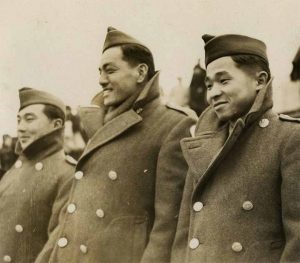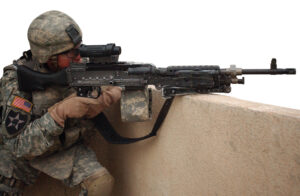By Fred L. Borch
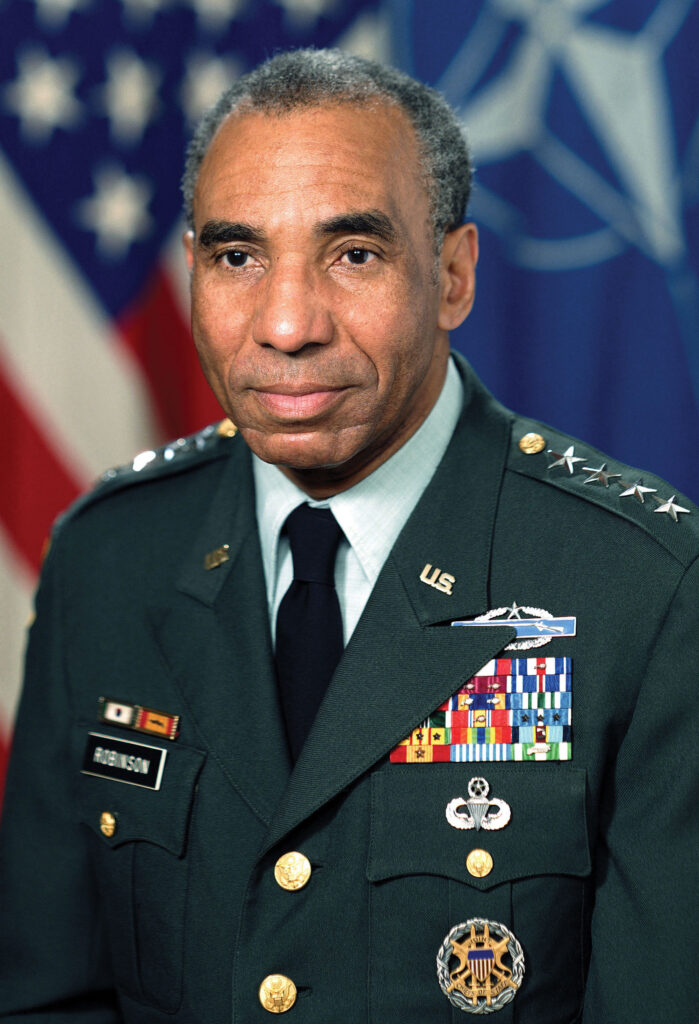
Known for his outstanding leadership, love of soldiers, and success as a commander in combat, General Roscoe Robinson, Jr., was unique in U.S. Army history as the first black four-star general in the Army and the first black four-star graduate of West Point.
While “Robby” Robinson would say that this recognition—being the first African American officer to wear four stars on his shoulders—was not important to him, history nonetheless will remember this extraordinary achievement.
When Robinson entered the Army as a cadet in 1947, the U.S. armed forces were still racially segregated.
When he graduated and was commissioned as an Infantry lieutenant in 1951, many units were not yet integrated and there still were relatively few black officers wearing crossed rifles on their lapels, much less those who had graduated from the U.S. Military Academy (USMA). While it is historically significant that Robinson was the first black officer to wear four stars, this achievement had little, if anything, to do with race or ethnicity. Rather, it is clear in retrospect that Robinson’s phenomenal success as an Army officer resulted from his outstanding achievements as a combat commander in Korea and Vietnam, his demonstrated success in leading an airborne brigade and division, and his proven skills as a staff officer at the highest levels in Washington, the Pacific, and Europe.
Born in St. Louis, Missouri, on 11 October 1928, Robinson grew up in a close-knit family. His father, who had been a soldier in France in World War I, worked in a car wheel foundry and later managed an apartment complex. His mother was a woman of deep religious faith, and she took Robinson and his siblings to church every Sunday because she believed that “nurturing her children in matters of faith” would make them “mature, caring, and spiritually empowered adults.” Jim Crow was very much alive in St. Louis in the 1930s and 1940s, and young Robby attended a racially segregated high school. The school was known for its academic excellence and Robinson received a good education.
He was active in the Boy Scouts during his high school years, and his time as a Scout seems to have instilled in him both a clear sense of patriotism and an understanding of the responsibilities of citizenship. Robinson’s father also had a plan for his son, “I want you to get an education,” said the senior Robinson. “I don’t want you working in a foundry. I want you doing something that I was not able to do.”
In January 1946, at the age of seventeen, Robinson graduated from high school as salutatorian—number two in his class. In September, Robinson entered St. Louis University. Before he had settled into student life however, Claude Bakewell, who had recently been elected to the U.S. House of Representatives, made good on a campaign promise to appoint black men from his district to West Point. Robinson, uncertain about how he would pay for his tuition at St. Louis University, was interested in an all-paid education. He did very well in the competitive nomination process and was the First Alternate candidate for an appointment. When the principal candidate failed his physical examination, Robinson got the appointment. He entered USMA in July 1947.
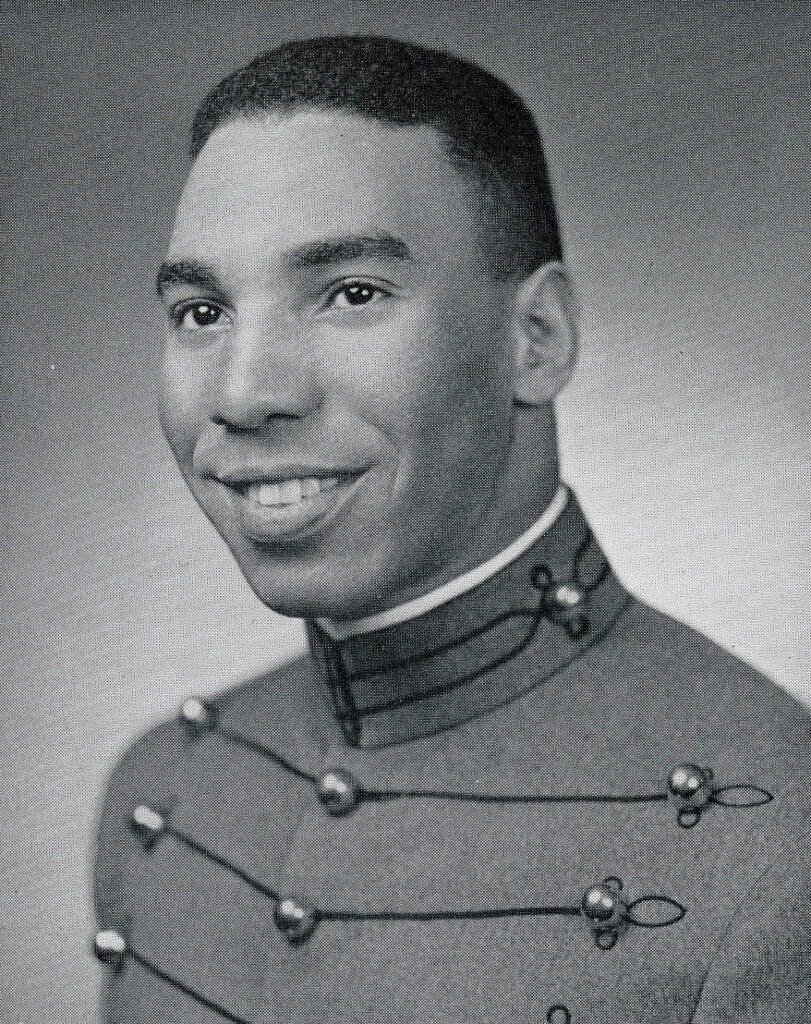
There were 600 in his class; only five were black. Before he left for New York, Robinson’s mother told him, “You can do as well as any other of the young men,” but continued, “If they don’t treat you right, just come on back home.” Many years later, Robinson would share his mother’s words and then remind listeners that he stayed at West Point.
His classmates included future astronaut Edwin “Buzz” Aldrin and future Army Chief of Staff Edward “Shy” Meyer. Robinson had always wanted to be a paratrooper, and he selected the 11th Airborne Division as his first assignment. Initially, he was told that black officers were not assigned to the division, but Robinson persisted in requesting assignment to the 11th and, after completing the Infantry Officer Basic Course and Airborne School at Fort Benning, Georgia, Second Lieutenant Robinson joined 3d Battalion, 188th Airborne Infantry Regiment, 11th Airborne Division, at Fort Campbell, Kentucky.
If Robinson had thought that the racially segregated Army was a thing of the past, he was wrong. The enlisted men in his battalion were all black; the battalion commander and most of the officers were white. Moreover, black officers were housed in segregated Bachelor Officer Quarters, and black soldiers were housed in barracks separate and apart from the barracks for whites. The entire Fort Campbell experience was an eye-opener for Robinson, but he learned that black soldiers were in the 11th Airborne because they wanted to be there. As he put it: “I gained a great amount of respect for those soldiers in that battalion, because they really wanted to soldier. They wanted to prove that they were as good as anybody else.”
While at Fort Campbell, Robinson completed Jumpmaster School and was promoted. His commanding officer observed that Robinson was an “efficient, intelligent and an aggressive officer who performs his duty in a commendable manner. He commands the respect of his fellow officers and enlisted personnel.”
After marrying Mildred “Millie” Simms, whom he had been dating since his last year at West Point, First Lieutenant Robinson’s hope for an extended honeymoon with his new wife was cut short. He received orders for the 31st Infantry Regiment, 7th Infantry Division, in Korea and reported for duty in October 1952.
Within a short time, Robinson was the commanding officer of Company C, 1st Battalion, 31st Infantry. His unit, ranging from 175 to 240 soldiers, was frequently in combat. Over the next six months, Robinson led his company in patrolling and in counter-attacking Chinese positions. Robinson later remembered that he might easily have been wounded or killed by small arms fire or enemy mortars while he was in Korea, recalling, “We hugged the dirt. We got behind some of the smallest rocks you would want to get behind. The shooting becomes very personal out there when you are all by yourself.” He was deeply affected by the soldiers in his company who were killed in action. “I do recall,” Robinson remembered, “quite vividly, the first guys that we lost. That was very traumatic. We were always concerned about leaving somebody. That is why we emphasized we don’t leave anybody [behind].”
At the end of his tour in Korea, Robinson had not only learned a lot about himself but also about leading men in combat. Now wearing the Combat Infantryman Badge on his fatigues, Robinson returned to the United States in 1953 and rejoined his old unit at Fort Campbell. After the excitement of being a company commander in combat in Korea, being a platoon leader and company executive officer at Campbell was a let-down. However, a great opportunity presented itself: Robinson was asked if he wanted to join the Airborne Department at Fort Benning.
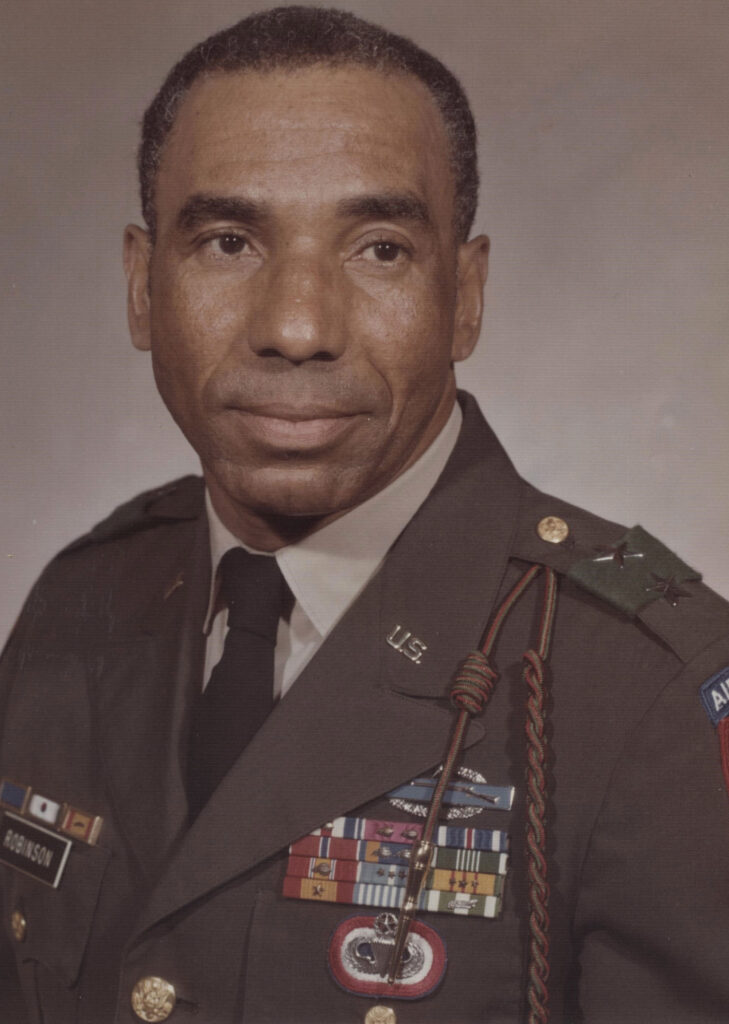
Robinson loved being a paratrooper and he was excited to be an instructor in the Jumpmaster and Pathfinder Schools. There was little doubt in Robinson’s mind that part of the rationale for his selection was the fact that he was black, as the Army was continuing to integrate all its units—including the Airborne Department. Robinson took this in stride as this was yet another opportunity to demonstrate his talents as an officer and learn more about airborne operations.
At the end of his tour at Fort Benning, now-Captain Robinson hoped to return to the 11th Airborne Division. Instead, he was assigned to Liberia as a training officer in the U.S. Military Support Mission to that country. There were only about 2,000 soldiers in the Liberian Frontier Force and the U.S. mission consisted of seven men—four officers and three noncommissioned officers. All were black.
Once again, Robinson understood that it was not an accident that he had been chosen for this assignment, but he took his job seriously and did his best. His two years in Liberia also gave him some valuable insights into what role U.S. armed forces should play in Africa and America’s political goals there. On a personal note, he and Millie adopted a baby girl.
The Robinsons did not have any children at this time and when a Liberian mother brought a baby into the Mission Office and asked if any Americans serving there were interested in adopting her, the Robinsons did not hesitate. They were thrilled to be able have beautiful baby Carol join them. In December 1959, Captain Robinson reported to the 82d Airborne Division. He wanted to be a company commander but instead was assigned as the S4 in 2d Battle Group, 503d Parachute Infantry Regiment. Ultimately, he took command of Company E, 2d Battle Group, 504th Parachute Infantry Regiment. It was during this command with the 82d that Robinson honed his personal leadership philosophy. First, always “Be prepared.” Second, “Always do the best job that you can at whatever you do.”

Robinson attended the Command and General Staff College from 1963 to 1964 and, when he and Millie left Fort Leavenworth in 1964, he was now wearing gold oak leaves. The Robinsons also had added a second child to their family, Bruce, whom they adopted when he was four months old. This adoption was unusual for the time, in that Bruce was white. While white parents in the 1960s were adopting black children, it was very unusual for black parents like the Robinsons to adopt a white child.
In adopting a child born in Liberia, the Robinsons had already shown that loving a child had nothing to do with background or parentage—adding Bruce to their family made perfect sense. From Fort Leavenworth, Major Robinson went to the University of Pittsburgh to study international affairs. He earned an M.A. and then moved to a new assignment in the Pentagon.
Three years in the Infantry Branch’s Office of Personnel Operations gave Robinson first-hand experience with promotions, adverse actions, and eliminations. In 1967, Lieutenant Colonel Robinson deployed to Vietnam, where he initially served as the Assistant Chief of Staff, Logistics (G4), 1st Cavalry Division. On 1 February 1968, he took command of 2d Battalion, 7th Cavalry Regiment. This was a significant emotional event since the day before the Viet Cong and North Vietnamese Army had launched the Tet Offensive across South Vietnam in the hope that it would trigger a general uprising amongst the populace.
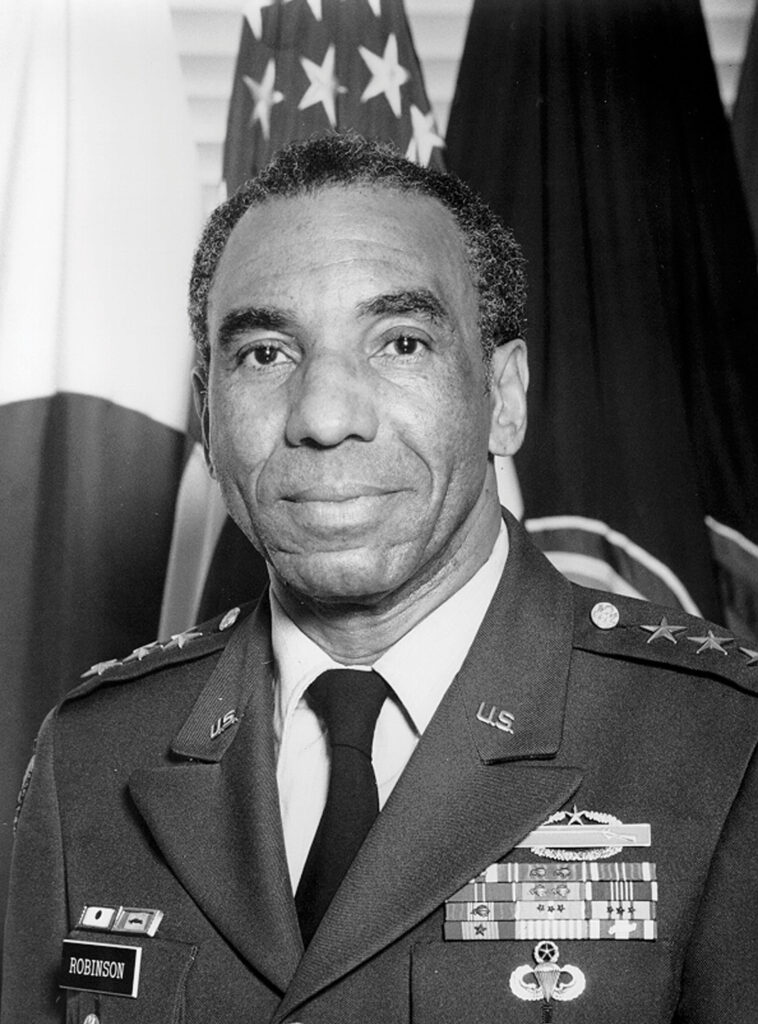
Robinson’s battalion was in the thick of the fighting and participated in Operations STREET WITHOUT JOY and DELAWARE. In the second operation, Robinson’s battalion was ordered to the A Shau Valley to find and destroy North Vietnamese supply dumps and weapons caches. It was a difficult operation and while Robinson and his unit did achieve some success, it was short-lived as the enemy returned to the area as soon as the Americans departed.
While in Vietnam, Robinson showed time and time again that he was an outstanding combat commander. An officer who knew what Robinson had done told others that: Of the remarkable things that he [Robinson] had done in Vietnam, two involved his personally landing [the helicopter] in the thick of firefights when his battalion was engaged, refusing to leave until all of his wounded were evacuated from the field.
On another occasion, he was personally involved in the killing of one enemy soldier and the capture of another when the odds against him were particularly heavy. Lieutenant Colonel Robinson’s leadership while in battalion command from 1967 to 1968 was recognized with two awards of the Silver Star, the Distinguished Flying Cross, eleven Air Medals, and the Legion of Merit. The citations for Robinson’s two Silver Stars lauded his “conspicuous gallantry and intrepidity in action against the enemy.”
Robinson attended the National War College from 1968 to 1969 and, after graduating in 1969, Robinson was assigned to U.S. Pacific Command. He worked in the Southeast Asia Plans Branch (J5). His boss was Admiral John S. McCain, Jr., whose naval aviator son was held as a prisoner of war in North Vietnam beginning in 1967, and later served as a U.S. Senator from Arizona. Promoted to colonel in February 1972, Robinson now returned to Fort Bragg to take his dream assignment: command of 2d Brigade, 82d Airborne Division. He decided that he should focus on readiness first, so Robinson spoke personally with every company commander to get a feel for what was happening in every company.
He then spoke directly with soldiers in each company to get some insights into the overall unit climate. Robinson then used this information to rate his companies, their leadership, and their readiness. He would discuss his ratings with each company commander orally and in person; he did not want to put anything down in writing when it was better to discuss the matter face-to-face. Major (later Major General) Thomas Needham served as the S3 in 2d Brigade.
Needham remembers that: Robinson’s total focus was on the mission. He insisted that 2d Brigade had to be ready at all times. Robinson had very high standards and he expected all of the men in the brigade to do their best at all times. He was what in football is called a ‘block and tackle’ guy because he concentrated on the basics. What impressed me most of all was that Robinson never got upset, lost his temper, or took things personally.” During his time as a brigade commander, Robinson reflected on his career and noted that “the most interesting, the most challenging, and the most enjoyable assignments I’ve had were troop assignments, especially those I had been in command.
In July 1973, while still in command, Robinson was promoted to brigadier general. Twenty-two years had passed since he had been commissioned as an Infantry officer. Major General Frederick Kroesen, then commanding the 82d Airborne (and who would reach four-star rank and serve as Vice Chief of Staff of the Army), helped Millie Robinson pin on her husband’s stars. Then-Brigadier General Robinson was off to Okinawa as the Deputy Commanding General, Okinawa Base Command. During this time, as the Army worked harder to improve race relations, Robinson had the opportunity to give his opinion on the issue.
In a 1973 speech, he said: Race relations education in the Army has been established to increase interracial communication and awareness, and to develop rapport among all personnel, thereby reducing the potential for racial tension. The objective is to maintain the highest degree of organizational and combat readiness through the creation of harmonious relations all personnel (emphasis supplied).
Robinson certainly knew that the Army had not yet overcome racism and still had work to do. While he understood that social and racial injustice still existed, his argument was that better race relations were required because combat readiness demanded it.
In 1976, Robinson returned to Fort Bragg to command the 82d Airborne Division. From the beginning, he was focused on readiness—making sure that the Army’s only airborne division was prepared to deploy on a combat mission without any prior notice. In December 1978, Major General Robinson relinquished command. He later would remark that his time at the 82d was the highlight of his military career because soldiers in the division “have a spirit that…makes us special.” Robinson now reported to Heidelberg, West Germany, and assumed duties as the Deputy Chief of Staff, Operations, U.S. Army Europe. Two years later, he was promoted to lieutenant general and took command of U.S. Army Japan and IX Corps.
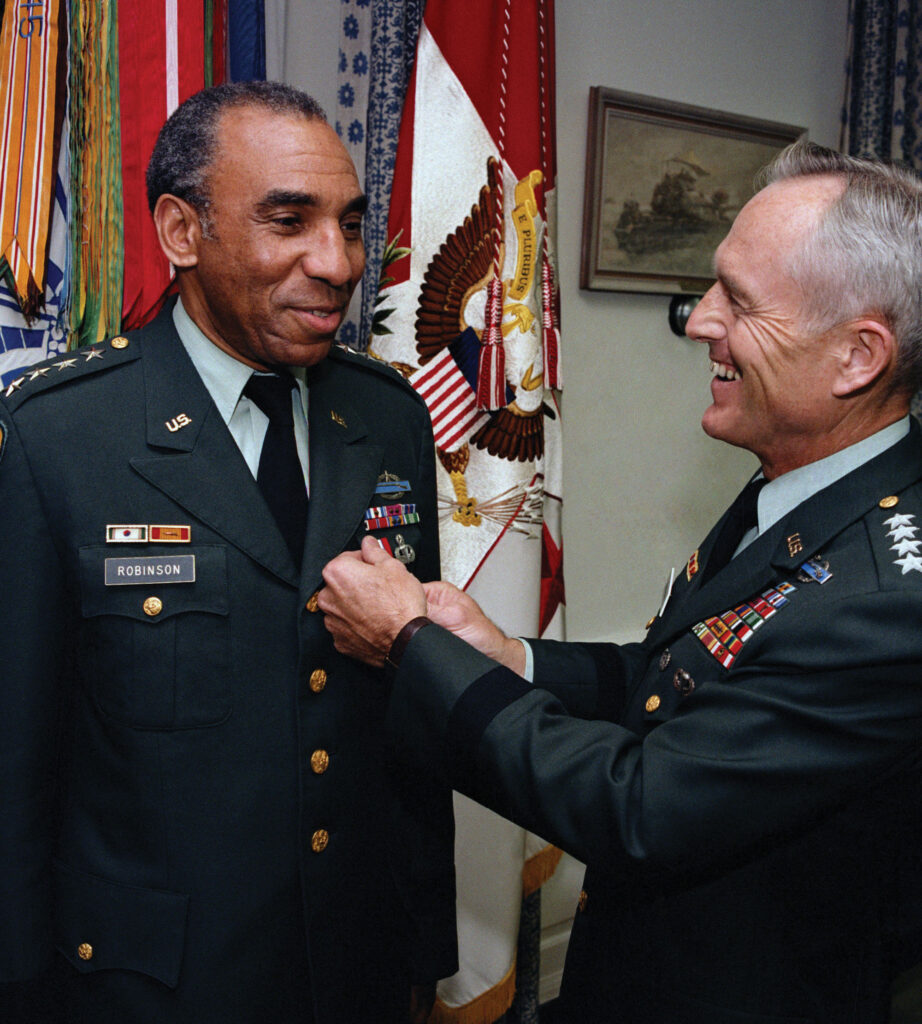
In August 1982, Robinson made history when Army Chief of Staff General Edward C. Meyer and Millie Robinson pinned four-star rank on his shoulders. General Robinson then assumed duties as the U.S. Military Representative to NATO.
Over the next three years, he discussed military matters with the other NATO military representatives. This required considerable patience and diplomacy—and Robinson excelled because he had been well prepared in his more than thirty years of soldiering. Robinson retired from active duty in November 1985, at the age of fifty-eight. At his retirement ceremony at Fort Myer, Virginia, he summed up his last days in uniform by saying: When asked the question, why did you stay in the Army?
I would say: ‘Where else do you have the opportunity for meaningful service to our nation? And most importantly, where else do you have the opportunity to provide direction and leadership to outstanding men and women, who also want to serve their country? I always wanted to be remembered as a person who cared about his people, a person who when given any job, would do it to the best of his ability and would do it with concern for those around him. As for being the first black four-star general, Robinson was adamant in his views: “I always wanted to be an American general who just happened to be black. I didn’t want to be a black general. I am black and that is fine but I certainly didn’t feel that was an issue.”
Life is not fair and it was not fair to General Robinson. He was diagnosed with leukemia in 1991 and died two years later, aged sixty-four. A few months prior to his death, Robinson was honored with the Distinguished Graduate Award at West Point by the Association of Graduates—a high honor bestowed on very few. Roscoe Robinson could not have been more deserving. He was a role model for thousands and thousands of soldiers in his almost thirty-five years of active duty, and he will always have an important place in Army history.
